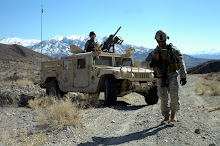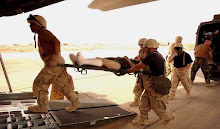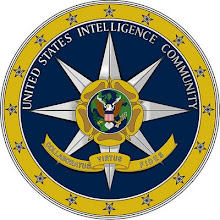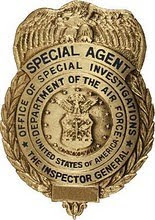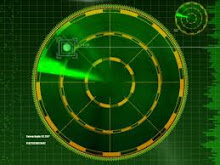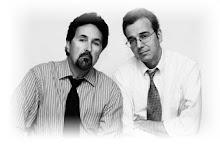By Steve Hammons
The new fact-based fiction movie "The Men Who Stare at Goats" deals with more than meets the eye. Or at least, we see some subjects touched on in quick and sometimes subtle ways that might trigger more thought.
In other scenes, certain topics are dealt with at length or even hit viewers between the eyes with a cinematic sledgehammer.
Incredibly funny parts of the movie are juxtaposed with the troubling, tragic and frightening.
Besides looking at the concepts of the First Earth Battalion and its real-life outside-the-box leader Army Lt. Col. Jim Channon (played by Jeff Bridges), we also get a glimpse at the Vietnam War years and post-Vietnam U.S. Army. These were dark and difficult times in the military and in America.
Yet, the 1960s and ´70s also brought forth the "human potential movement" which included a variety of touchy-feely human encounter activities, experimentation with mind-altering substances, a renewed interest in planet Earth and the natural environment, as well as the value of peace and human love.
From the troubled years after the Vietnam War to the conflicts in Iraq and Afghanistan, moviegoers are asked to consider some basic questions about human beings, the U.S. government and military, and even the forces of good versus "the dark side."
THE HUMAN MIND
The movie, and the book upon which it is based, bring together various subjects in ways that give us the opportunity to reflect further about the larger, deeper and more complex aspects of the real-life material.
For example, the research and operational activities of Project STAR GATE, probably the most widely-known U.S. remote viewing program, was not part of Channon's First Earth Battalion.
However, as indicated by the scene when George Clooney identifies the contents of a small closed box as "a man sitting in a chair," remote viewing did turn out to be a real and valid human skill. Generally speaking, it is a sub-type of ESP, but conducted according to specific and scientific research and operational protocols.
Remote viewing-type skills are related to what we call intuition, gut feelings, instincts and the sixth sense. We probably all have these abilities and can practice and develop them further.
Some of the Project STAR GATE personnel reportedly had quite excellent results at times.
On a separate topic, in the movie an entire Army outpost in Iraq is slipped a mind-altering substance, LSD, via the food and water. In fact, during Army and CIA research of LSD a couple of decades ago, unwitting troops, intelligence officers and civilians were reportedly given this substance to test its effects.
The dangers of this and other mind-altering substances are clearly demonstrated in one troubling and shocking scene. This danger is real and was an unfortunate result for many people in the '60s, '70s and beyond. In fact, certain mind-altering drugs continue to cause severe health, social and legal problems today.
The often valuable research into human consciousness, from the '60s to the present, has been marred in many cases by excess, ignorance, misuse and dangerous behavior. Defining, understanding and separating worthwhile and constructive approaches from stupid and destructive behavior continue to be a challenge now.
VICTORY WITHIN REACH
In the movie, we also get glimpses of the positive potential of human beings, our military and our society.
When the Jeff Bridges character has a near-death experience in Vietnam after being shot, we might wonder about the many reports of similar encounters that have been thoroughly researched and documented. And we might wonder what conclusions can be drawn from them.
The reverence for the Earth through various rituals by some of the characters can also be interpreted as a valid perspective that connects humans with Nature – and helps keep our feet on the ground as well as offering benefits to mental and spiritual health.
Mention in the movie of U.S. military humanitarian operations, peace operations, conflict resolution and similar activities might seem whimsical. However, these activities are now considered important parts of American foreign policy and important missions of the U.S. armed forces.
How fitting that the movie portrays some recent activities in Iraq and Afghanistan as being part of "the dark side."
"The Men Who Stare at Goats" is a funny, thought-provoking and very entertaining movie. It moves along quickly, but not like the rapid-fire pacing of a thriller. It is more like a gentle roller-coaster of humor and tragedy, action and more contemplative moments, with representations of good and evil, light and darkness.
Perhaps most importantly, the movie gives us insight into human nature at its best and worst. The lessons that can be learned from the film, and the stories upon which it is apparently loosely based, are probably more valuable than we might think.
Human consciousness is now changing and evolving in ways that might result in developments so positive that the goals of people like Col. Channon may finally be within reach.
skip to main |
skip to sidebar

In the past 30 days, readers from approximately 40 countries or territories using about 20 languages visited the Joint Recon Study Group site.

To see more articles, scroll down the right-side column.

Steve Hammons

Articles from the Joint Recon Study Group site and Transcendent TV & Media site are included.
The Joint Reconnaissance Study Group is the San Diego-based, combined-service/agency, research-and-activities team in my novels "Mission Into Light" and sequel "Light's Hand." This site contains information of interest to the JRSG.
Home page: Joint Recon Study Group site
Readers from around the world visit this site.

In the past 30 days, readers from approximately 40 countries or territories using about 20 languages visited the Joint Recon Study Group site.
April 2021 threat alert: ‘Force protection’ for our troops now the responsibility of all Americans
First responders must deal with society’s problems, shortcomings, injustices every day
Could some UFOs be linked to Native American 'white stone canoe' legends, stories?
Wildland firefighter basic training available at community colleges, tech schools, training centers
‘Boomer remover’ coronavirus is bigger threat to WWII generation that saved the world
‘Black swan’ events that aren’t: Coronavirus, climate emergency, unidentified aerial phenonema
Reagan’s complete 1987 UN message on ‘alien threat’ overlooked: Grave danger here, now
Was Reagan briefed about UFOs and original ‘Day the Earth Stood Still’ movie?
My military draft lottery number was #165 during final Vietnam War years
“Keep On The Sunny Side,” by The Whites, from movie O Brother, Where Art Thou?”
Living along Ohio River for centuries, Native Shawnee called it ‘Kiskepila Sepe’ – ‘Eagle River’
Native American words around us: States, towns, rivers, lakes, terrain, plants, animals, military
Athens County, Ohio, was key spot when colonists, Redcoats fought Shawnee in 1774 battle
1787 Northwest Ordinance set course for Ohio, Indiana, Illinois, Michigan, Wisconsin, Minnesota
Smallpox-tainted blankets were 1763 bioweapon on northern Appalachian Mountains frontier
Diana Krall performs “Maybe You’ll Be There" live in Paris with Paris Symphony Orchestra 2001.
Books to read in 2021? Novels "Mission Into Light" and the sequel "Light's Hand"
Novel excerpt: Renew, prepare America with ‘Urgent Response Group’ for teens, young adults
Diana Krall performs “I Get Along” live in Paris with Paris Symphony Orchestra 2001.
Steve Tyrell sings “Give Me the Simple Life.”
Diana Krall performs “Love Letters” live in Paris with Paris Symphony Orchestra 2001.
Visit the article archives!

To see more articles, scroll down the right-side column.
Novel "Mission Into Light" overview on Amazon
Novel "Light's Hand" overview on Amazon
Adventures of the Joint Recon Study Group: Overview and synopses of activities and operations
Key chapter overviews: Points of interest in the novel "Mission Into Light"
Key chapter overviews: Points of interest in the novel "Light's Hand"
Multimedia rights available
English and foreign-language book rights, audio book and e-book rights for "Mission Into Light" and "Light's Hand" are available. Movie and TV rights are available.
I'm seeking agent representation for these works and rights.
Please contact Steve Hammons for more information at hammons55@gmail.com.
Feature film screenplay
I completed a feature film screenplay in 2006 based on “Mission Into Light” and “Light’s Hand” combining key elements of both novels.
The screenplay takes audiences into the adventures and discoveries of the Joint Recon Study Group and the relationships among team members, friends and associates as they explore leading-edge research and emerging transcendent developments.
I'm seeking agent representation for this screenplay.
.........................
I also wrote a TV series pilot script based on "Mission Into Light" and "Light's Hand" story. I'm seeking agent representation this script.
About the Author

Steve Hammons
About the Author
I was born and raised in southwestern Ohio near the Kentucky and Indiana borders, then went to college at Ohio University in the southeastern Appalachian region of the state near West Virginia.
I graduated with a dual major in communication (journalism focus) and health education (psychology focus) with a minor in pre-law.
Ohio U. is home to the respected Scripps College of Communication and E.W. Scripps School of Journalism.
I also completed two graduate-level courses in guidance counseling theory and method at Ohio U.'s College of Education, School of Applied Behavioral Sciences and Educational Leadership.
At the end of my undergraduate education at Ohio University, I moved to the beautiful American Southwest where I applied my education, continual training and and ongoing experience to related professional fields such as health care, journalism and special research areas.
My novels "Mission Into Light" and the sequel "Light’s Hand" are available in e-book and 6"x9" paperback from most online booksellers worldwide.
Readers review metaphysical-military-intelligence adventure novel ‘Mission Into Light’
My articles on DoD CultureReady blog, Defense Language and National Security Education Office
Transcendent TV & Media site
Past articles: Scroll down the right-side column for more articles.

Articles from the Joint Recon Study Group site and Transcendent TV & Media site are included.




























































